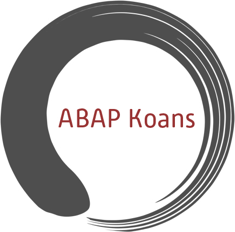Essentially a Koan is a problem to solve.
Or from the Wikipedia article I think the most relevant explanation is:
Insight has to be demonstrated. A mere "answer" to a koan is not sufficient. The teacher is not looking for a specific answer, but for evidence that the disciple has grasped the state of mind expressed by the koan itself. I think this is particularly relevant to the field of programming. For this I am borrowing from the idea of the original Ruby Koans which involves the practitioner fixing a number of broken unit tests. Using a unit test framework allows for rapid feedback of the topics being discussed and using an IDE we can easily insert breakpoints to explore the code at run-time.
- If you have an ABAP 7.4+ System than please use the 'master' branch.
- If you have an ABAP System between 7.02 and 7.31 please use the '7.02-7.31' branch.
The 'master' and the '7.02-7.31' branch never will be merged together!
- $ABAP_KOANS: this package contains everything and is the main entrypoint.
- Navigate to the the global classes and go to the 'local Testclass section'. Run the ABAP Unit Tests with the shortcut CTRL+SHIFT+F10 and solve step by step the ongoing challenges.
- only change the local Testclass to solve every step!
- Download this repository as a zip
- Create a package
$ASE_KOANS - Install abapGit. How to:
- Create a program
ZABAPGITin transaction SE38 - Copy and paste the content from latest abapGit build
- Create a program
- Run ZABAPGIT
- Create an offline project by click
+Offline- Name: ABAP Koans
- Package: $ABAP_KOANS
- Click on
Import zipand import the downloaded repository ZIP
- Create an offline project by click
